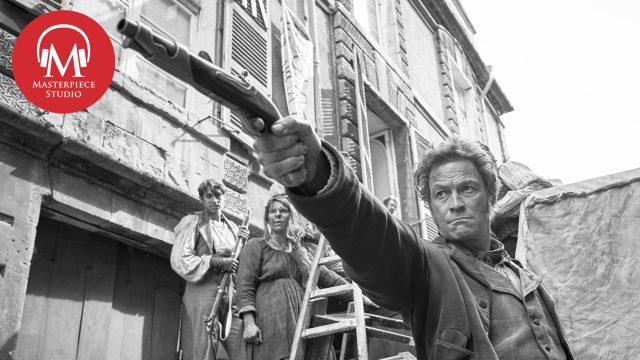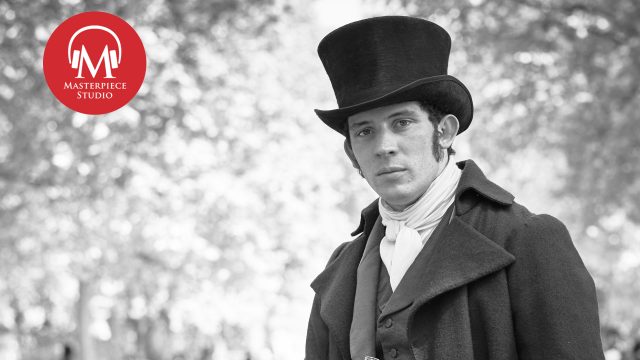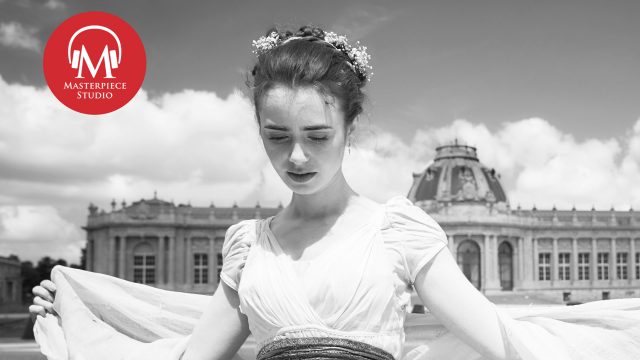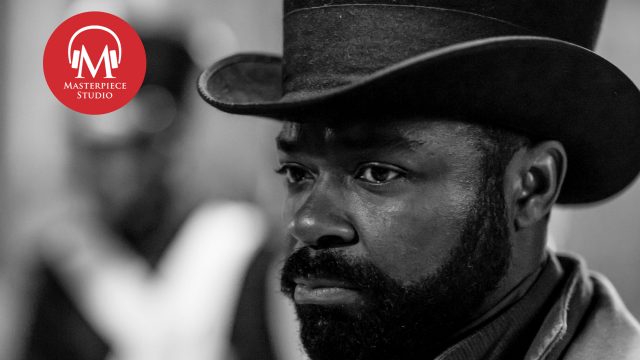After a career of playing notable villains, actor Dominic West says he’s ready to turn a new leaf. So his role as the tortured thief, Jean Valjean, in the new MASTERPIECE production of Victor Hugo’s classic novel, Les Misérables, is a helpful bridge to be a better man on screen. In an interview, he talks about what it means to play Valjean, how his character seeks personal redemption and what the rest of the series has in store for the repentant former prisoner 24601.
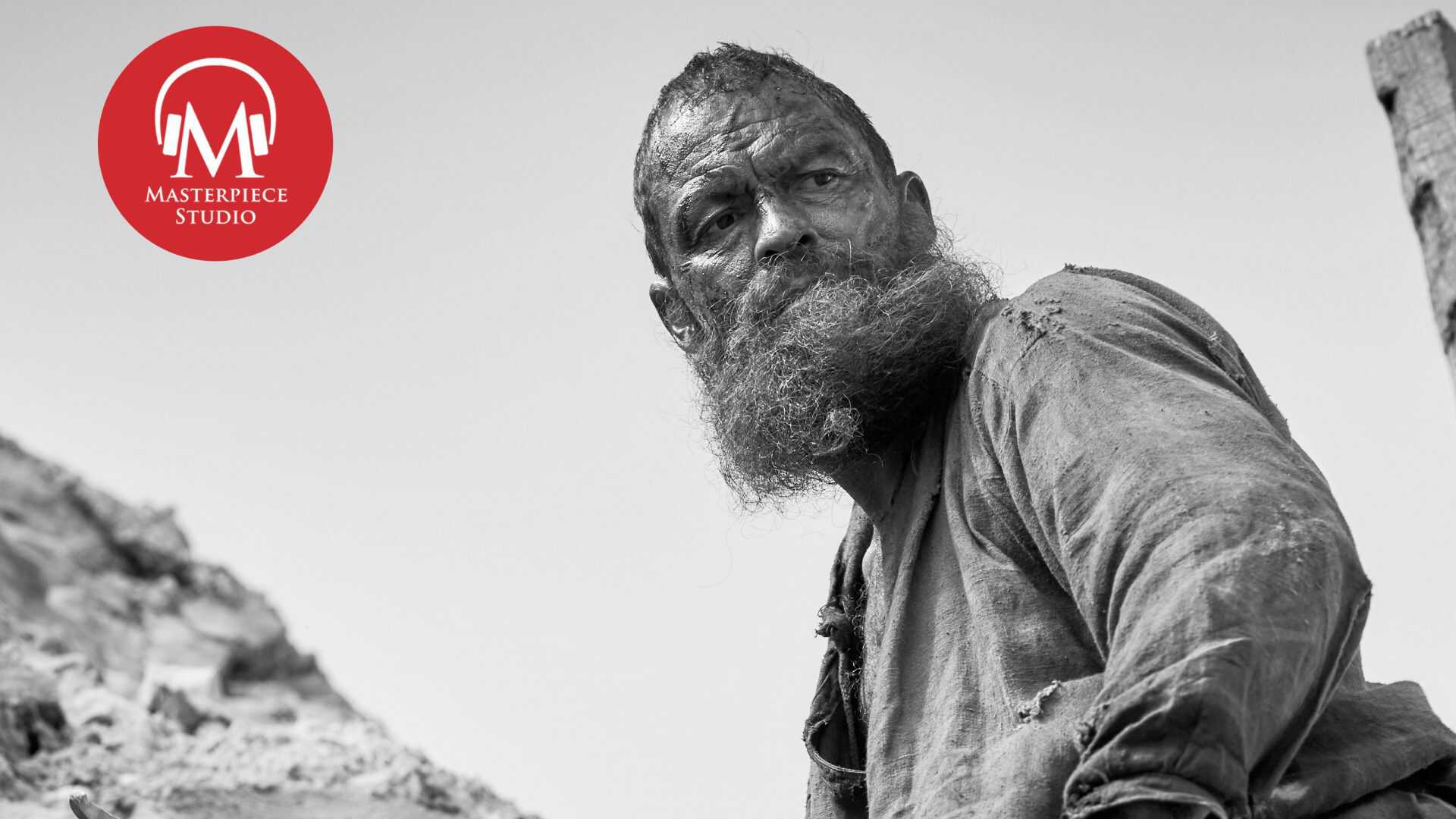

Just Like Jean Valjean, Dominic West Is Done Being A Bad Guy
Released 22:48
Related to: Les Misérables
Download and subscribe on: iTunes | Spotify| RadioPublic
Transcript
Jace Lacob: I’m Jace Lacob, and you’re listening to MASTERPIECE Studio.
The story is well known — an impoverished man steals a loaf of bread to feed his family, and spends 19 years in prison. Upon his release, the convict nearly falls prey to old habits… but instead spends the rest of his life struggling to prove he has truly reformed.
CLIP
Old Woman: What are you doing there, my friend?
Jean Valjean: Trying to sleep, what does it look like?
Old Woman: Why don’t you go to an inn?
Jean Valjean: I did. They wouldn’t take me. No would take me.
Jace: In Andrew Davies’ sweeping new adaptation of Victor Hugo’s legendary epic, Les Misérables, the bleak stakes of the story take on dazzling new heights.
CLIP
Bishop: Consider this: even if the world has done you a great injustice, does it really serve you to have a heart full of bitterness and hatred?
Jean Valjean: How could I not have a heart full of bitterness and hatred? I’d like to see you after 19 years in the hulks! So don’t preach to me about God and love.
Jace: Best known for his turns in The Wire and The Affair, actor Dominic West has made a name for himself playing villainous rogues on American and British television, and his role as Jean Valjean includes its fair share of monstrous rage and sly trickery. Despite all this, he also found room for moral clarity.
Dominic West: This man’s a brute…for whom compassion and humanity has been withheld for 20 years, and it takes a bit more to for him to be able to control that bestial side.
Jace: West joins us to explore Valjean’s story still to come in Les Miserables, why he might be done with playing scoundrels, and how he and his wife have become their own real-life Monarchs of the Glen in their castle-hotel in Scotland.
And we are joined this week by Les Misérables star and executive producer, Dominic West. Welcome.
Dominic: Thank you very much. Hi.
Jace: Jean Valjean has preternatural strength and a secret identity. Is he the first superhero in literature?
Dominic: He’s not the first because I suppose you’ve got the Greeks, but he’s the best. And he climbs buildings like Spiderman and he beats people up like Iron Man and he rescues children like Superman. But none of those superheroes did 19 years hard labor in a 19th century French jail, so he’s the toughest of the lot. I think.
Jace: We all know Jean Valjean’s prisoner number by heart and his story of redemption. What was the initial appeal of playing Valjean?
Dominic: The initial reservation was that he had been played so many times before and that the film of the musical had just come out, and therefore what the hell have we got to add to it and certainly what have I got to add to the part? But the appeal came once I started reading the book and I realized it’s the best book I’ve ever read, and probably ever written. And that he’s I think the greatest hero in literature. And I quickly fell in love with him and I suppose what was most appealing about him, apart from his strength and ability to save children’s lives, etcetera, was his inner heroism, his heroics of battling your own demons and trying to do what’s right rather than what you impulsively and emotionally feel like doing.
Jace: We see Valjean not when he’s released from prison, but at the thick of it at the quarry. He strikes a massive boulder and it plummets down onto a guard, the same man who hit him earlier when he’s led through Toulon in chains. Is this an accident, or an intentional act on his part?
Dominic: It’s very much intentional. He’s been brutalized for 19 years and he’s quite happy to want to kill anybody and certainly kill his tormentors. What becomes an accident is that he then rescues the guy that he’s just dropped the rock on and that of course is usually significant later on in Javert’s recognition of Valjean later. So no, he’s a brutalized brute who wants to harm people, wants to get revenge.
Jace: Even in these early scenes there’s an almost magnetic pull between Valjean and Javert that feels almost psychosexual, in a way.
CLIP
Javert: Well now, 24601. What was all that about today? You saving that guard’s life, why? If you were trying to get yourself an early release, you tried in vain. There’s no hope of that, no hope at all.
Jace: And why is Javert so obsessed with this particular prisoner?
Dominic: Well it’s the big question it was the first question I asked in rehearsal, it’s the obvious question — What the hell is wrong with this guy? You know? What’s his beef? Why is he…? Because it’s not very apparent in the book at all. And I think we discuss this a lot and my preference is always to go for the big motivators which are love and sex. I think that’s what motivate most of us the most. And so I think there’s a huge magnetic attraction that Javert has for Valjean, and David hints that in the scene where I’m stripping off and he has a look, and it’s just one look, and it’s sort of…it just lets it hang there. David didn’t want to overplay that bit because I think he thought what was more important was the attraction that a very small bitter mind has for the big mind, that a mean person has for a generous person, that the devil has for a saint. You know, I think that that’s probably more interesting.
Jace: These two men come to represent two very different sides in a philosophical debate about good and evil. Why is Valjean’s ultimate optimism, the notion that change and forgiveness are possible, so refreshing particularly right now?
Dominic: Well I suppose it’s fairly standard thinking now, that we’re not born bad, that we are the products of our environment and of our, of how people treat us. But when this book was written this was very much a philosophical debate that people believed, you know, people like Javert, that people are born bad and there’s nothing you can do about it. I think after, you know, a century of psychology and modern psychology and we realize that that’s not necessarily the case, but it’s worth being reminded of these things because I suppose you know, in modern political life in the UK and the US there’s a lot of currency in vilifying people for what they are, rather than who they are.
Jace: I mean even recently in France protesters called Emmanuel Macron “President of the Rich.” I mean Les Misérables feels incredibly relevant and timely given the class struggles and sort of wealth inequality of today. Does that notion sort of stick with you, having played this part?
Dominic: Yeah I mean the French revolution happened because the gap between rich and poor had never been wider. And I think it’s a lot wider now. And I think one thing that Victor Hugo understood was that once that chasm between rich and poor widens enough, there’s going to be trouble. And that it’s unsustainable. And I think I remember making this realizing that, you know, this what we have now, which is an enormous gulf between rich and poor in the world and in America, it’s pretty dangerous territory. And revolution tends to follow that sort of territory.
Jace: One year later Valjean is released from prison and giving one hundred nine francs after various deductions. But more importantly he gains his name back and becomes more than just a number.
CLIP
Javert: Here is your passport. You are required to show it to the authorities in every town and village you pass through. You have your name back, Monsieur 24601. I wonder if you can remember what it is.
Valjean: Jean Valjean.
Javert: You sure about that?
Valjean: JEAN VALJEAN!
Jace: Why is this such a powerful and profound moment of self-identity for the prisoner?
Dominic: Well I suppose from what you said, he you, know he becomes a human being again, rather than a statistic or a number or a commodity. And hence his shouting to the echoing forests and wide open valley that he’s now free to roam. He shouts his name. And it’s very interesting with Valjean, his journey goes from being a number, to being Valjean, to being Monsieur Madeleine, when he’s the mayor, to being one in denial of Jean Valjean and of that being a personality that he is ashamed of, until his final embrace of that. And so it’s it’s very crucial to his arc and his development and his evolution that his names plot very clearly, what he’s called is very, very relevant to his state of mind.
Jace: I love the scenes between you and Sir Derek Jacobins, Bishop of Dean.
CLIP
Valjean: You give me a bed right next to yours? Are you crazy? How do you know I’m not a murderer?
Bishop: That’s the Good Lord’s business, not mine. Or to put it another way, I’ll take my chance with you, my friend. Go to bed now, and sleep well.
Jace: What was it like filming these scenes with Derek Jacobi?
Dominic: Well it was bliss. It was. I mean I’ve admired him for years, and it is a tricky one when you got to cast the sort of most virtuous, nicest best man who’s ever lived, which is how he reads in the book. It’s so hard to write about virtue, it’s so hard to make virtue interesting. It’s easy to make the devil funny and interesting but it’s hard to make a saint interesting. And that’s what Victor Hugo does and that’s what Derek Jacobi does. And there’s very few actors who can do that, can make virtue interesting. But acting with him, who is a real hero of mine was in one sense, it’s dead easy because he does it all for you and he’s so sympathetic and another it’s very salutary, it’s very…he was extraordinarily, he was very detached, you didn’t get involved talking much, he sat very quietly at the side of the set until he’s called. He’s very contained as an actor. And very generous. It was great watching a master at work.
Jace: There’s a beautiful moment right before the Petit Gervais incident when Valjean collapses under the tree. We hear the church bells ringing out. We see the sunlight streaming through the leaves of the tree. It’s a really beautiful moment and then there’s temptation in this sort of Garden of Eden. The singing boy with his coin. What makes Valjean fall once more?
Dominic: Well it’s interesting, but in the book and I think in the script, too, but we didn’t end up filming it, is when he’s under the tree, having encountered love and kindness for the first time in 19 years from the Bishop, he remembers his mother and he remembers the last time he felt loved, which was from his mother. And so that was what was going on at that moment of where the transformation is starting to happen. It’s been put in place by the Bishop of Dean, he remembers his mother and in the book that sort of precipitates his anguish, when his best side comes out, what makes him fall, what makes the scorpion sting? You know, he’s a scorpion and this man’s a brutalized man who for whom compassion and humanity has been withheld for 20 years and it takes a bit more for him to be able to control that bestial side.
Jace: ‘You’re a dirty thief,’ Petit Gervais screams at him. How much will these words haunt him in these episodes to come?
Dominic: Well totally, and I think what’s interesting, what’s so beautiful about how Victor Hugo makes the agent of Valjean’s change being a little child, a defenseless child who is essentially, Valjean sees him, the bestial Valjean sees him as someone weak and therefore to be exploited. And what he learns is that the weak are what give us humanity and one’s attitude and one’s treatment of the weak is crucial to our humanity.
Jace: You mentioned a damascene conversion. After stealing Petit Gervais’s 40 sous, he changes his mind. He calls out to him. There’s a look of profound agony on your face as he searches his soul. Is this the moment where he where he does decide to be good?
Dominic: Yeah I think it is. I think the whole tragedy of his life and of his brutality comes crashing in on him he realizes that the deep, deep, deep sorrow of what’s happened to him in the last 20 years. And I think as soon as he’s allowed to pity himself in a way is is when he starts to love himself again.
Jace: Valjean collapses on the road curling up into a fetal ball in the dirt. Should we read the scene as a spiritual or moral or rebirth?
Dominic: Yes, very much so. Yeah, and I think that that element of the remembering the mother, which was we didn’t show explicitly, that is very much what Victor Hugo was writing I think that this is, he is reborn back into humanity.
Jace: What was it like filming this particular sequence?
Dominic: It was bloody hard. It was really hot. It was really hot and it was the end of a long day that finally I had had to collapse. And I did seem to spend a lot of the shoot in tears. But for some reason at this point I couldn’t, the tears didn’t come. Which is fine, because they didn’t have to, but I was very conscious that this was probably the most important single moment of the whole story. And that can be very daunting to try and act. So I found it hard, and I’m still not entirely happy with it.
Jace: This first episode centers on both Valjean and Fantine. There are circumstances in this first episode are very different but they’re forced to make a choice by the end of the installment. Are they mirrors for each other in a way?
Dominic: Yeah, I suppose as she descends, he ascends. I suppose her attitude to Valjean the prisoner would probably be similar to what her daughter’s is later on, of revulsion and horror and what happens of course when they meet is that he becomes her protector.
Jace: Before this next question, a quick word from our sponsors…
Jace: You’ve played a lot of philanderers in your career, whether that’s McNulty or Noah on The Affair. Hector Madden in The Hour. Willie in Collette. Many, many philanderers. Why is that, do you think?
Dominic: I don’t know. I mean I’ve played a lot of villains and this was one of the, I suppose that was the initial attraction of Valjean was not playing a villain, playing the hero and the good guy, but as to why it’s philandering, I don’t know. I’m not, I don’t know, I’ve no idea why people think I’m suited for philanderers. But they think I seem a villain. So hopefully after this I’ll be just plain, monogamous heroes.
Jace: Your big break came with David Simon’s seminal HBO series The Wire, my favorite all time series where you played Jimmy McNulty. Was there a sense at the time that this was a groundbreaking piece of television?
Dominic: I don’t think so. I think I’m sure we were all aware that with The Sopranos and that this was the dawn perhaps of a new golden era. But it’s very hard I find to take an objective view on things, I mean, and I’m only just starting to get an objective view on Les Misérables, in fact. And certainly while we were shooting The Wire, no one, no one was watching it, really. I mean, a few law enforcement people and lawyers and a few gangsters but no one really was watching and certainly no one from the UK, and so I didn’t really, I wasn’t really aware of how important it was and how what a groundbreaking series it was until much later. I think you’re just too close to see these things.
Jace: True or false you joined: in Argentina you joined an Argentinian circus for a spell?
Dominic: I did, De La Guarda. Yeah it was, it was only in New York for a while and I did it in London for five months. Best job I ever had.
Jace: Sarah Treme, who created The Affair said of you quote, ‘He’s not afraid to let a character be complicated. There’s a flawed humanity that he seems to understand inherently.’ How do you react to that?
Dominic: What a lovely thing for Sarah to say. Yeah, I do get a lot of philanderers and a lot of villains but usually they have another side to them, and I think it’s essential no one is purely evil or purely good. Most of us are conflicted. So it’s important to be an actor who can portray that.
Jace: Given how well you nail the accent in The Wire and The Affair, are fans ever surprised to realize you’re not American in real life?
Dominic: They are, I’m glad to say. Yeah, they still are. People still come up and are amazed. But I remember whenThe Wire had just come out in the UK and was getting quite a big following and there was a charity night and I was asked to go along. And it was a quiz night, that was as a charity night that was a quiz night, and the way the quiz was entirely about The Wire. And so it was full of Wire nuts, you know, people who really knew the show. And I remember going in and I had to ask the final question or something like that and I started speaking and I just remember sensing the whole room deflate with disappointment that hearing my accent when they realized I was a Brit. So, usually in America people are pleasantly surprised, in the UK, people are unpleasantly surprised that I’m just a Brit.
Jace: Off screen you’re living your own version of Monarch Of The Glen. You recently rescued your wife Catherine’s family seat Glin Castle in County Limerick and converted it into a family run hotel. How is that project going?
Dominic: Well it’s great fun. It’s not true to say we rescued it, it was run as a hotel by her parents and then her father unfortunately died. So it was put on the market. But yeah, we decided to keep it going and to try and make it a going concern. It has been in my wife’s family for 700 years, really not much choice, but it’s going OK, actually. It’s going remarkably well, I think. You know, Ireland is sort of booming at the moment and I think once nobody from Europe is allowed to go to Britain anymore, then they’ll all flock to to Ireland.
Jace: Who is funnier —Dominic West or Olivia Colman?
Dominic: Olivia Colman is spectacularly funny and able to laugh and joke right up until they say action, when she is then able to go into as serious moment as you care for, which is not something Dominic West can do quite as well. And as I found to my cost on the set of Les Mis, it was maybe that scene where we had the big fight at the Thenadiers’, and we were all crying with laughter at what Olivia was saying and then I realized of course that I had to do some proper acting. So I then tried to avoid her after that.
Jace: You directed an episode of The Wire and an episode of Jimmy McGovern’s Moving On. Is directing something you’d like to do more of in the future?
Dominic: Yeah I after doing that I thought that’s what I wanted to do forever and then I realized actually, well two things happened — when I started getting very good acting parts, I didn’t really have time for directing, and the other one was I realized that a director is first in and last out, whereas an actor is last in and first out.
Jace: You left Guild Hall in 1995 one of your first onscreen roles that year was the Earl of Richmond in Richard III opposite Sir Ian McKellen. Was it a formative professional experience?
Dominic: Oh very much so. And Robert Downey, Jr. was in it, Annette Bening was in it, Maggie Smith was in it. It was an amazing cast that I was just out of drama school and was able to sort of go around watching them all at work. And it was headed by Ian McKellen who’s a really great leading man in terms of his compassion and his ability to lead a cast and keep everybody happy. It was yeah, it was a wonderful job and an amazing job to have at an early stage in your career, because it was with a lot of people who were very generous with their knowledge.
Jace: You once reached out to wine critic Robert Parker to try and interview him. What ended up happening?
Dominic: He lives in Baltimore, so I was in Baltimore and I said, ‘Look can I come and interview you?’ and he said, ‘No you can’t but I’ll tell you what, if you bring some of The Wire cast, I’ll bring the wine.’ And so we went out for dinner and there were four or five of us from The Wire. Andre, who played Bubbles, was with us and insisted on drinking Jack and Coke the whole time. I was telling him, ‘This is the best wine you’ll ever have in your life, and you insisted on Jack and Coke?’ So we drank a lot of extremely great wine and I can’t remember much about it other than Robert Parker very generously gave us an hundred year old bottle of cognac and he said ‘I want you to open that when you finish the last frame of The Wire,’ and we did, which happened to be at six o’clock one morning in Baltimore. And we nailed the whole bottle.
Jace: That’s amazing. Dominic West, thank you so very much.
Dominic: Thank you very much.
Jace: Jean Valjean is the narrative core of Les Misérables. But his lifelong nemesis, the relentless Inspector Javert, keeps things moving in his pursuit of personal justice.
David Oyelowo: He has no problem in saying that person is a criminal, and so therefore they deserve this punishment.
Jace: Actor David Oyelowo joins us next week on the podcast with a close look at how Javert’s need for truth and justice propels Victor Hugo’s epic forward.
MASTERPIECE Studio is hosted by me, Jace Lacob and produced by Nick Andersen. Elisheba Ittoop is our editor. Susanne Simpson is our executive producer. The executive producer of MASTERPIECE is Rebecca Eaton.
Les Misérables Podcasts 4 More Podcasts
MASTERPIECE Newsletter
Sign up to get the latest news on your favorite dramas and mysteries, as well as exclusive content, video, sweepstakes and more.











